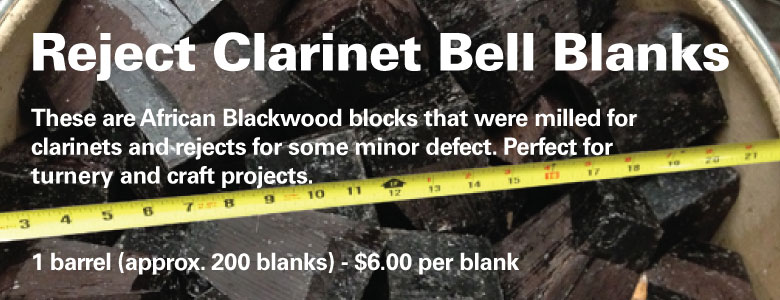-
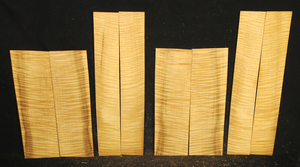
Also called Pepperwood & Bay Laurel, this is found on the Pacific coast from southwestern Oregon to southern California. It has a fairly fine texture and takes a beautiful polish. Partially air dried.
-
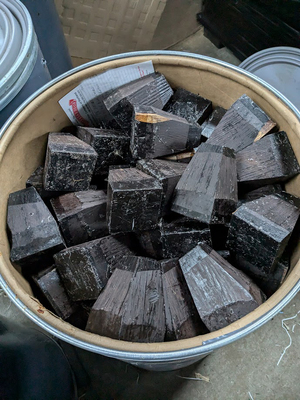
The heartwood of African Blackwood is purplish to brownish-black with dark gray streaks giving an overall impression of being black. Lustrous with an attractive inner chatoyance. Very hard, heavy, close-grained, and virtually free from pores. Its main use is in turning, and it claims the title of the finest of turnery woods, well known as the standard by which other turnery woods are judged. Long a favorite of ornamental turners, the nature of the wood allows very fine detail with sharp cutters, leaving a beautiful, burnished surface.
Some blanks may have sapwood corners or more, burly or wild grain, occasional bug holes, small inclusions, small checks, i.e. they have the small defects common to Blackwood. That said these have to be the best quality rejects I have seen in nearly 30 years. A good percentage have no discernible defects and those that do have minor ones.
They are an odd size to make it easier to turn the bell or flared end of a clarinet. On one end they are 2 3/4-3 1/4" square and the other end is 1 3/8-1 5/8" square with tapered sides as in the photo. Length is 4 3/4-5 1/4".
The barrel will ship via freight truck. Please call us if you have any questions. 503-274-1271
Due to CITES regulations, we can only ship this species to customers in the United States.
A has 196 pieces.
B has 196 pieces.
C has 198 pieces.
D has 195 pieces.
E has 193 pieces.
F has 195 pieces.
-

220 volt, three phase, no tooling. Would prefer pick-up from our warehouse in Portland, Oregon but might be persuaded to crate and ship.
Give us a call for more details. 503-274-1271
-

Also called European Basswood, this species grows throughout Europe. It was the favorite wood of the English carver Grinling Gibbons and the German Gothic sculptor Tilman Riemenschneider. Pale in color, it has a straight grain and fine, even texture. It is easy to work and can easily be carved with, against, and cross the grain. It is recognized as one of the classic carving woods. Air-dried.
-

This striped wood develops a beautiful golden patina as it ages.
-
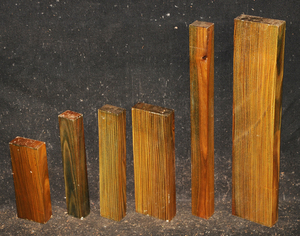
One of the world's densest and oiliest woods. The green to greenish-brown heartwood weighs between 80 to 90 lbs/cubic foot. Long used for its self-lubricating qualities in marine applications such as propeller shaft and rudder shaft bearings, it is also thought to have medicinal and healing properties. Its oily nature makes it difficult to glue but makes it a fantastic turning wood.
Any Lignum Vitae on our site is genuine Lignum, not Verawood. We also have Verawood in stock and will be labeled as such on the website.
Due to CITES regulations, we can only ship this species to customers in the United States.
-
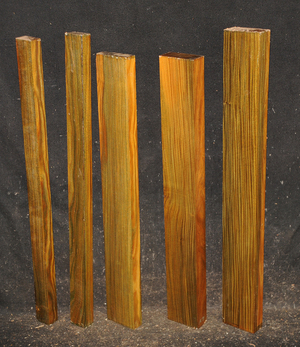
One of the world's densest and oiliest woods. The green to greenish-brown heartwood weighs between 80 to 90 lbs/cubic foot. Long used for its self-lubricating qualities in marine applications such as propeller shaft and rudder shaft bearings, it is also thought to have medicinal and healing properties. Its oily nature makes it difficult to glue but makes it a fantastic turning wood.
Any Lignum Vitae on our site is genuine Lignum, not Verawood. We also have Verawood in stock and will be labeled as such on the website.
Due to CITES regulations, we can only ship this species to customers in the United States.
-
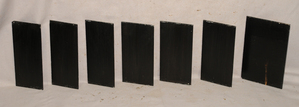
Sometimes called Gabon or Gaboon, this Ebony is sometimes jet black but oftentimes has grayish streaks that mostly disappear when finished or after the made object has been put into service. This Ebony has a marked resistance to checking that is characteristic of some of the Indian and Asian species. It has a wonderful texture and is easily carved, planed, turned, and milled. It is fairly fine-grained and takes a high polish. This Ebony usually originates in either Cameroon or Nigeria and the logs are rough hewn in the forest and oftentimes brought to the nearest road by human porters. With the disappearance of other species of black Ebony this species is fast becoming the Ebony of choice.
-
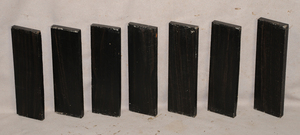
Sometimes called Gabon or Gaboon, this Ebony is sometimes jet black but oftentimes has grayish streaks that mostly disappear when finished or after the made object has been put into service. This Ebony has a marked resistance to checking that is characteristic of some of the Indian and Asian species. It has a wonderful texture and is easily carved, planed, turned, and milled. It is fairly fine-grained and takes a high polish. This Ebony usually originates in either Cameroon or Nigeria and the logs are rough hewn in the forest and oftentimes brought to the nearest road by human porters. With the disappearance of other species of black Ebony this species is fast becoming the Ebony of choice.
-
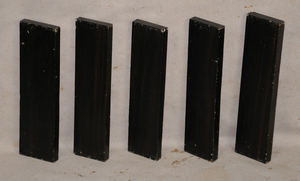
Sometimes called Gabon or Gaboon, this Ebony is sometimes jet black but oftentimes has grayish streaks that mostly disappear when finished or after the made object has been put into service. This Ebony has a marked resistance to checking that is characteristic of some of the Indian and Asian species. It has a wonderful texture and is easily carved, planed, turned, and milled. It is fairly fine-grained and takes a high polish. This Ebony usually originates in either Cameroon or Nigeria and the logs are rough hewn in the forest and oftentimes brought to the nearest road by human porters. With the disappearance of other species of black Ebony this species is fast becoming the Ebony of choice.
-
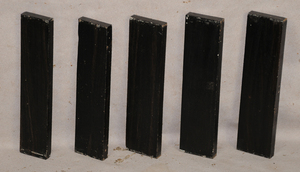
Sometimes called Gabon or Gaboon, this Ebony is sometimes jet black but oftentimes has grayish streaks that mostly disappear when finished or after the made object has been put into service. This Ebony has a marked resistance to checking that is characteristic of some of the Indian and Asian species. It has a wonderful texture and is easily carved, planed, turned, and milled. It is fairly fine-grained and takes a high polish. This Ebony usually originates in either Cameroon or Nigeria and the logs are rough hewn in the forest and oftentimes brought to the nearest road by human porters. With the disappearance of other species of black Ebony this species is fast becoming the Ebony of choice.
-
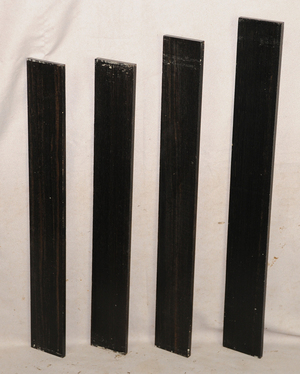
Sometimes called Gabon or Gaboon, this Ebony is sometimes jet black but oftentimes has grayish streaks that mostly disappear when finished or after the made object has been put into service. This Ebony has a marked resistance to checking that is characteristic of some of the Indian and Asian species. It has a wonderful texture and is easily carved, planed, turned, and milled. It is fairly fine-grained and takes a high polish. This Ebony usually originates in either Cameroon or Nigeria and the logs are rough hewn in the forest and oftentimes brought to the nearest road by human porters. With the disappearance of other species of black Ebony this species is fast becoming the Ebony of choice.
-
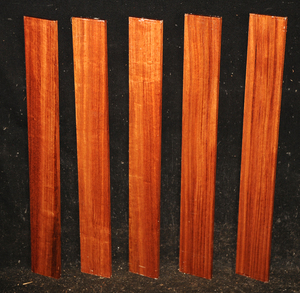
Called by some woodworkers African Rosewood, Bubinga is a deep, lustrous, brownish-red color with a fine, darker striping. It is very hard and heavy and takes a glassy, smooth finish.
Due to CITES regulations, we can only ship this species to customers in the United States.
-
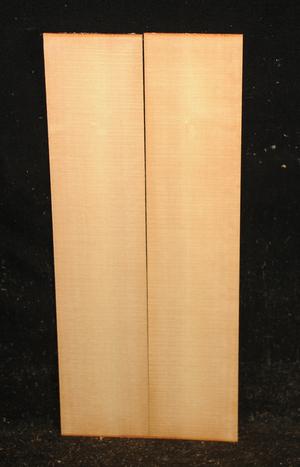
A conifer species native to the Pacific Coast of the U.S.A. It became well known during World War II because of its use in airplane construction. Widely used for sounding boards and tonewoods in the manufacture of musical instruments.
-
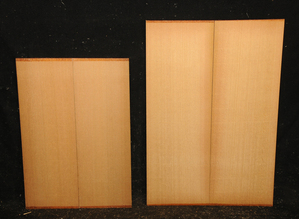
This is a large conifer species growing along the Pacific Coast of the U.S.A. At one time most wooden shingles used in the U.S.A. were cut from Western Red Cedar. Old-growth billets with little or no grain run-out produce excellent tonewood for guitars and other musical instruments.
-
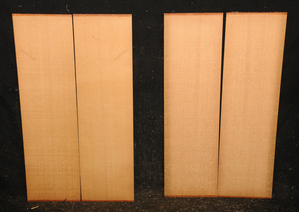
This is a large conifer species growing along the Pacific Coast of the U.S.A. At one time most wooden shingles used in the U.S.A. were cut from Western Red Cedar. Old-growth billets with little or no grain run-out produce excellent tonewood for guitars and other musical instruments.
-
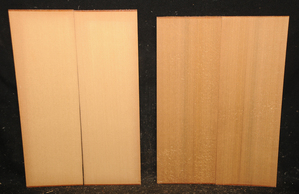
This is a large conifer species growing along the Pacific Coast of the U.S.A. At one time most wooden shingles used in the U.S.A. were cut from Western Red Cedar. Old-growth billets with little or no grain run-out produce excellent tonewood for guitars and other musical instruments.
-
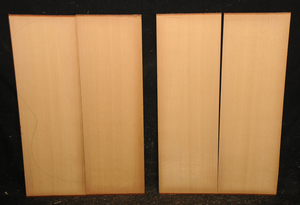
This is a large conifer species growing along the Pacific Coast of the U.S.A. At one time most wooden shingles used in the U.S.A. were cut from Western Red Cedar. Old-growth billets with little or no grain run-out produce excellent tonewood for guitars and other musical instruments.
-
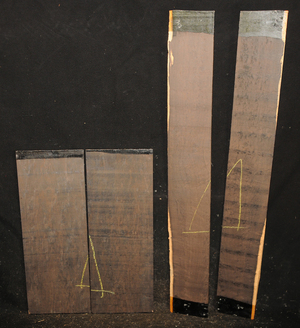
The heartwood is purplish to brownish-black with dark gray streaks giving an overall impression of being black. Lustrous with an attractive inner chatoyance. Very hard, heavy, close-grained, and virtually free from pores. Its stability and lovely tonal qualities make it an excellent instrument wood.
Due to CITES regulations, we can only ship this species to customers in the United States.
The backs of this set are what we call "plum pudding" figure, sort of a cross between quilted and curly, and quite rare in African Blackwood. The sides of this set are full of bird's-eyes. Normally we would want to match the sides and backs with similar figures but these are both so rare that we are not sure we would ever see their like in the sizes we would need to create a full set of matching figure. Please take a look at all the photos to see close ups of the afformentioned figuring.
-
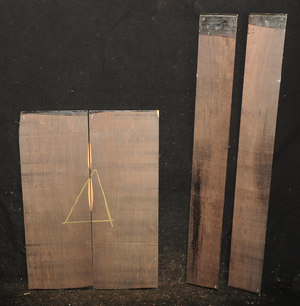
The heartwood is purplish to brownish-black with dark gray streaks giving an overall impression of being black. Lustrous with an attractive inner chatoyance. Very hard, heavy, close-grained, and virtually free from pores. Its stability and lovely tonal qualities make it an excellent instrument wood.
Due to CITES regulations, we can only ship this species to customers in the United States.




